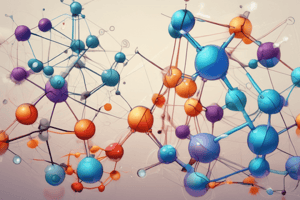Podcast
Questions and Answers
What is the primary focus of inorganic chemistry?
What is the primary focus of inorganic chemistry?
- The study of organic compounds.
- The study of compounds containing carbon and hydrogen atoms.
- The study of biological systems.
- The study of inorganic compounds derived from mineral sources. (correct)
Which branch of inorganic chemistry studies the role of metals in biological systems?
Which branch of inorganic chemistry studies the role of metals in biological systems?
- Bioinorganic chemistry (correct)
- Coordination chemistry
- Solid-state chemistry
- Organometallic chemistry
What is the term for compounds that donate a proton (H+ ion)?
What is the term for compounds that donate a proton (H+ ion)?
- Bases
- Oxides
- Acids (correct)
- Salts
What is the term for compounds containing oxygen?
What is the term for compounds containing oxygen?
What is the importance of water in inorganic chemistry?
What is the importance of water in inorganic chemistry?
What are silicates?
What are silicates?
What is the application of inorganic chemistry in the development of new materials?
What is the application of inorganic chemistry in the development of new materials?
What is the role of inorganic compounds in catalysis?
What is the role of inorganic compounds in catalysis?
What is the term for inorganic materials with a wide range of applications?
What is the term for inorganic materials with a wide range of applications?
Which branch of inorganic chemistry studies the synthesis, structure, and properties of solid inorganic compounds?
Which branch of inorganic chemistry studies the synthesis, structure, and properties of solid inorganic compounds?
Flashcards are hidden until you start studying
Study Notes
Inorganic Chemistry
Definition and Scope
- Inorganic chemistry is the branch of chemistry that deals with the study of inorganic compounds, which are typically derived from mineral sources.
- Inorganic compounds are typically composed of metals, nonmetals, and metalloids, excluding carbon and hydrogen atoms.
Branches of Inorganic Chemistry
- Coordination chemistry: study of complexes formed by central metal atoms or ions bonded to surrounding molecules or ions.
- Organometallic chemistry: study of compounds containing metal-carbon bonds.
- Bioinorganic chemistry: study of the role of metals in biological systems.
- Solid-state chemistry: study of the synthesis, structure, and properties of solid inorganic compounds.
Types of Inorganic Compounds
- Acids: compounds that donate a proton (H+ ion), such as hydrochloric acid (HCl) and sulfuric acid (H2SO4).
- Bases: compounds that accept a proton (H+ ion), such as sodium hydroxide (NaOH) and ammonia (NH3).
- Salts: compounds formed by the reaction of an acid and a base, such as sodium chloride (NaCl) and calcium carbonate (CaCO3).
- Oxides: compounds containing oxygen, such as iron oxide (Fe2O3) and silicon dioxide (SiO2).
Important Inorganic Compounds
- Water (H2O): a universal solvent and essential component of many biological systems.
- Silicates: compounds containing silicon and oxygen, common in minerals and rocks.
- Phosphates: compounds containing phosphorus, essential for biological processes such as DNA synthesis and energy transfer.
- Ceramics: inorganic materials with a wide range of applications, including construction, electronics, and biomedical devices.
Applications of Inorganic Chemistry
- Materials science: development of new materials with unique properties, such as superconductors and nanomaterials.
- Catalysis: use of inorganic compounds to speed up chemical reactions, essential in industrial processes.
- Environmental remediation: use of inorganic compounds to clean up pollutants and contaminated soil.
- Medicine: development of inorganic compounds with medicinal properties, such as anticancer drugs and imaging agents.
Inorganic Chemistry
Definition and Scope
- Deals with the study of inorganic compounds, which are derived from mineral sources.
- Inorganic compounds typically consist of metals, nonmetals, and metalloids, excluding carbon and hydrogen atoms.
Branches of Inorganic Chemistry
Coordination Chemistry
- Studies complexes formed by central metal atoms or ions bonded to surrounding molecules or ions.
Organometallic Chemistry
- Examines compounds containing metal-carbon bonds.
Bioinorganic Chemistry
- Investigates the role of metals in biological systems.
Solid-State Chemistry
- Focuses on the synthesis, structure, and properties of solid inorganic compounds.
Types of Inorganic Compounds
Acids
- Donate a proton (H+ ion), e.g., hydrochloric acid (HCl) and sulfuric acid (H2SO4).
Bases
- Accept a proton (H+ ion), e.g., sodium hydroxide (NaOH) and ammonia (NH3).
Salts
- Formed by the reaction of an acid and a base, e.g., sodium chloride (NaCl) and calcium carbonate (CaCO3).
Oxides
- Contain oxygen, e.g., iron oxide (Fe2O3) and silicon dioxide (SiO2).
Important Inorganic Compounds
Water (H2O)
- Universal solvent and essential component of many biological systems.
Silicates
- Compounds containing silicon and oxygen, common in minerals and rocks.
Phosphates
- Contain phosphorus, essential for biological processes such as DNA synthesis and energy transfer.
Ceramics
- Inorganic materials with a wide range of applications, including construction, electronics, and biomedical devices.
Applications of Inorganic Chemistry
Materials Science
- Develops new materials with unique properties, such as superconductors and nanomaterials.
Catalysis
- Uses inorganic compounds to speed up chemical reactions, essential in industrial processes.
Environmental Remediation
- Uses inorganic compounds to clean up pollutants and contaminated soil.
Medicine
- Develops inorganic compounds with medicinal properties, such as anticancer drugs and imaging agents.
Studying That Suits You
Use AI to generate personalized quizzes and flashcards to suit your learning preferences.




